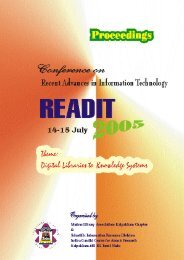READIT - 2009 - Indira Gandhi Centre for Atomic Research
READIT - 2009 - Indira Gandhi Centre for Atomic Research
READIT - 2009 - Indira Gandhi Centre for Atomic Research
Create successful ePaper yourself
Turn your PDF publications into a flip-book with our unique Google optimized e-Paper software.
Proceedings of <strong>READIT</strong>-<strong>2009</strong>, Kalpakkam - 603 102, 29-30 Dec <strong>2009</strong><br />
Semantic Search Engines: A brief analysis<br />
Rekha Rani Verghese<br />
Dept. of Library and In<strong>for</strong>mation Science, Pondicherry University<br />
E-mail: rekha_tcr@yahoo.com<br />
ABSTRACT<br />
The Semantic Search Engine or Third-Generation Search Engine is a search engine in which Semantic<br />
technologies and / or Natural Language Processing (NLP) techniques are applied. The objective of these products is to<br />
take advantage of the existence of structural data (RDF, micro <strong>for</strong>mats, and OWL) on the Web in order to process the<br />
in<strong>for</strong>mation included and offer to the end user an intelligent response. This paper tries to analyze seven search engines,<br />
which are using semantics or NLP techniques <strong>for</strong> in<strong>for</strong>mation retrieval.<br />
Keywords: semantic search, Natural Language Processing, Search Engines<br />
1. INTRODUCTION<br />
Knowledge is power. But too much in<strong>for</strong>mation can make you feel powerless. We are living in an<br />
in<strong>for</strong>mation society. There is so much in<strong>for</strong>mation available that it is sometimes difficult to decide<br />
what to do with it. While in<strong>for</strong>mation and knowledge have always been central to most human<br />
activity, there is a heightened perception now that in<strong>for</strong>mation is the key to success in diverse<br />
spheres, ranging from commerce to science. The in<strong>for</strong>mation revolution is, of course, powered by<br />
the advances in computer and communication technologies, most dramatically exemplified by the<br />
prodigious growth of the Internet. There is, however, a growing problem as the amount of<br />
in<strong>for</strong>mation on diverse subjects increases. It is becoming difficult to filter the useful from the<br />
useless; the accurate from the inaccurate and the reliable from the unreliable. Here comes the<br />
importance of semantic search engines, based on semantics or NLP techniques <strong>for</strong> in<strong>for</strong>mation<br />
retrieval.<br />
2. SEMANTIC SEARCH ENGINES<br />
Semantics is the branch of linguistics that deals with the study of meaning, changes in meaning, and<br />
the principles that govern the relationship between sentences or words and their meanings or the<br />
study of the relationships between signs and symbols and what they represent. The Semantic Web is<br />
an evolving development of the World Wide Web in which the meaning (semantics) of in<strong>for</strong>mation<br />
and services on the web is defined, making it possible <strong>for</strong> the web to understand and satisfy the<br />
requests of people and machines to use the web content. Semantic search has the power to enhance<br />
98

















